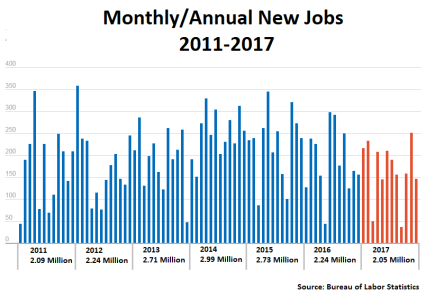[TABLE="class: tablewrapper"]
[TR]
[TD="class: econo-reportname, colspan: 2"]
GDP
[/TD]
[/TR]
[TR]
[TD="colspan: 2"]
| | | | |
[TABLE="class: actual_consensus_box"]
[TR="class: actual_consensus_toprow"]
[TD] | Prior | Consensus | Consensus Range | Actual |
| Real GDP - Q/Q change - SAAR | | | | |
| GDP price index - Q/Q change - SAAR | | | | |
| Real Consumer Spending – Q/Q change – SAAR | | | | |
[TD="class: econo-releaseinfo"] Released On 11/29/2017 8:30:00 AM For Q3(p):2017 [/TD]
[TD="class: actual_consensus_box_numbers"]3.0 %[/TD]
[TD="class: actual_consensus_box_numbers"]3.3 %[/TD]
[TD="class: actual_consensus_box_numbers"]2.8 % to 3.5 %[/TD]
[TD="class: actual_consensus_box_numbers"]
3.3 %
[/TD]
[TD="class: actual_consensus_box_numbers"]2.2 %[/TD]
[TD="class: actual_consensus_box_numbers"]2.2 %[/TD]
[TD="class: actual_consensus_box_numbers"]2.1 % to 2.2 %[/TD]
[TD="class: actual_consensus_box_numbers"]
2.1 %
[/TD]
[TD="class: actual_consensus_box_numbers"]2.4 %[/TD]
[TD="class: actual_consensus_box_numbers"]2.5 %[/TD]
[TD="class: actual_consensus_box_numbers"]2.4 % to 3.0 %[/TD]
[TD="class: actual_consensus_box_numbers"]
2.3 %
[/TD]
[/TD]
[/TR]
[/TABLE]
[/TD]
[/TR]
[TR]
[TD="colspan: 2"] Highlights
Third-quarter GDP proved even more solid than the first estimate, revised 3 tenths higher in the second estimate to an as-expected 3.3 percent annualized rate. Nonresidential investment and inventory growth added a little more in the second estimate while residential investment and net exports subtracted a little less. These offset a slightly smaller contribution from consumer spending, at a 2.3 percent rate vs 2.4 percent in the first estimate and expectations for 2.5 percent. The drop off on the consumer side was centered in durables which, despite a slight downgrade, still grew at an 8.1 percent rate getting a boost from hurricane-replacement demand for autos.
Turning back to inventories, whether builds are actually positive or negative for the outlook are always difficult to assess, but given this year's general strength in consumer and business demand, the third-quarter build is probably a positive for the outlook, suggesting that businesses were stocking up for strength ahead including for the holiday shopping season. [more]
https://www.bloomberg.com/markets/economic-calendar
[/TD]
[/TR]
[/TABLE]

